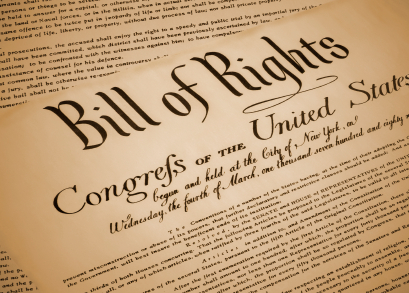Have you hugged James Madison lately?
Exactly 220 years ago today, the first Congress of the United States approved twelve articles of amendment to the Constitution and sent them to the states for ratification. Ten of those proposed articles were eventually ratified and enshrined as the Bill of Rights.
Prior to the birth of the United States, nearly every citizen on earth was to one degree or another under the rule of a czar or a king or a potentate of some sort. The monarch limited the citizens to a much greater degree than the citizens limited the monarch.
To over simplify it worked like this. Live on land that I own, grow what I tell you to grow, give to me what I tell you to give and in return I, the king, will do my best to keep the king from the other side of the mountain from coming in and burning your village.
Whether they thought about it or not, the citizens of the kingdom had traded liberty for security.
The founders wished to stand that ages-old model on its head. In the American colonies, the people were willing to largely take their chances with respect to security if the government would just leave them alone.
And the colonies thus became states and the states convened to write a constitution that created a federal government with specific – and very limited powers.
And yet, almost immediately, those limits seemed to many, insufficient. Many of the citizens of the new country were concerned that the federal government could and would overstep.
And thus James Madison proposed in the very first meeting of the Congress of the United States twelve articles of amendment. Madison’s proposed amendments were nothing more than a continuation of the heated battle during the Constitutional Convention concerning the appropriate level of power held by the federal government.
If the government under the Articles of Confederation that preceded the Constitution was too weak, the fight was on during the Constitutional Convention to make sure that the resulting government under the Constitution was not too strong.
Distrust of government ran high in 1789 and the Bill of Rights reflects that discomfort.
Thus the Bill of Rights prohibits Congress from establishing a national religion. The Bill of Rights prohibits denial of the right of the people to keep and bear arms. The Bill of Rights prohibits the denial of life, liberty or property without a due process of law, prohibits the federal government from forcing citizens to provide quarters to troops, prohibits the federal government from assuming powers not specifically granted by the Constitution.
The Bill of Rights doesn’t so much set forth our rights as it limits the rights of government.
What the people of the new American republic understood that we are gradually forgetting is that the king was very good at denying liberty but only marginally capable of providing security. Despite the king’s implicit promise, security for the peasants was a very tenuous proposition.
It is no different today. We don’t have a king but we have a burgeoning federal government with an increasingly imperial attitude and a very spotty record of making good on its promises. Those that believe that the government can provide security in an uncertain world do so in the face of a mountain of evidence to the contrary.
Despite having confiscated trillions in taxes over the past seven decades, Social Security is bankrupt. The same goes for Medicare. If you’re younger than about 59 years old, you have every reason to worry about collecting from these two programs.
Despite knowledge that it was coming days in advance, government proved ineffective at protecting the citizens of New Orleans from the ravages of Hurricane Katrina.
A mountain of regulation and an army of bureaucrats did not protect the economy from the mortgage meltdown.
Bernie Madoff stole billions of dollars from innocent men and women right under the noses of the government employees who were supposed to be watching him.
Beyond a certain rather minimal level, the government cannot provide you with security. To the extent that you desire security and can obtain it, you must do so for yourself.
Which is why the founders argued so vehemently over our Constitution. Our liberty is our security.
Today, as politicians seek to secure our favor — and their continued employment — by offering cradle to grave security (read: “free” health care), we would do well to remember the wisdom of our founders and vigorously re-embrace their circumspect view of government.









I read a series of comments tonight on a blog aimed at Gen X’ers, the gist of which was that old people and the soon-to-retire boomers ought to sit down, shut up and get over our infatuation with Reagan style conservative government. After all, the kids argue, conservatism has failed and old people are stupid. We should just get out of the way so the party can begin, say the ones who can write a coherent sentence.
I’ve never read anything so vacuous and utterly absent any semblance of rational thought. Someone has so thoroughly spoiled this generation that they haven’t the slightest clue how an economy really works. They really believe that all you have to do is shake the money tree a bit and whine and the dollars will come falling out to take care of whatever you need. They’re furious with my generation for trying to keep them away from the tree.
What bunch of idiots taught them to believe that money grows on trees?
Uh………………..Oh!
Never mind.
Paul your monologue of this was excellent. Very, very well written and informative. It’s amazing how quickly we will put our tin cup out and ask for change.
“Any society that would give up a little liberty to gain a little security will deserve neither and lose both.” –Benjamin Franklin
“Arise and take our stand for freedom as in the olden time.” –Winston Churchill
“Freedom is not a gift bestowed upon us by other men, but a right that belongs to us by the laws of God and nature.” –Benjamin Franklin
Ben Franklin: “We must not have those in poverty comfortable. We must DRIVE them out”.